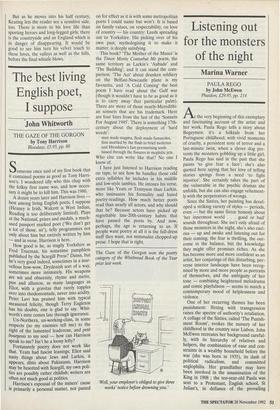The best living English poet, I suppose
John Whitworth
THE GAZE OF THE GORGON by Tony Harrison Bloodaxe, L5.95, pp. 80 Someone once said of my first book that it contained poems as good as Tony Harri- son's. I wondered idly who this chap with the folksy first name was, and how neces- sary it might be to kill him. This was 1980. A dozen years later and Harrison lives best among living English poets, I suppose (Heaney is Irish, Walcott is West Indian, Reading is too deliberately limited). Plays at the National, prizes and medals, a much- used passport marked poet ('We don't get a lot of those, sir'), telly programmes not only about him but entirely written by him — and in verse. Harrison is here.
How good is he, as stagily Yorkshire as Fred Trueman, his sometime pamphlets published by the Scargill Press? Damn, but he's very good indeed, sometimes in a mar- vellous bow-wow, Drydenish sort of a way, sometimes more intimately. His weapons are wit and obscenity, rhyme and metre, pun and allusion, as many languages as Eliot, with a gravitas that rarely topples over into rhodomontade, never into aridity. Peter Levi has praised him with typical measured felicity, though Terry Eagleton has his doubts, one is glad to say. Whit- worth's mite comes late through ignorance.
Un-Northern, un-working-class, in some respects (so my enemies tell me) to the right of the lamented leaderene, and petit bourgeois to my soul — how can Harrison speak to me? Isn't he a loony lefty? Fortunately poetry does not work like that. Yeats had fascist leanings; Eliot said nasty things about Jews and Larkin, it appears, ditto about Pakistanis. Harrison may be besotted with Scargill, my own poli- tics are possibly rather childish; writers are often not much good at politics. Harrison's espousal of the miners' cause is primarily a personal matter, not pasted on for effect as it is with some metropolitan poets I could name but won't. It is based on family values, on respectability, on love of country — his country: Leeds spreading out to Yorkshire. His picking over of his own past, mythologising it to make it matter, is deeply satisfying.
This book? 'The Mother of the Muses' is the Timor Mortis Conturbat Me poem, the same territory as Larkin's 'Aubade' and `The Building', and it can stand the com- parison. 'The Act' about drunken soldiery on the Belfast-Newcastle plane is my favourite, and 'A Cold Coming' the best poem I have read about the Gulf war (though it wouldn't have to be as good as it is to carry away that particular palm). There are more of those nearly-Meredithi- an sonnets that are his trademark. Here are four lines from the last of the 'Sonnets For August 1945'. There is something 17th- century about the deployment of 'hard words':
men made magma, flesh made fumaroles, first mottled by the flash to brief mofettes and Hiroshima's fast-pressurising souls
hissed through the fissures in mephitic jets. Who else can write like that? No one I know of.
I have just listened to Harrison reading on tape, to see how he handles those odd extra syllables he includes in his middle and low-style iambics. He intones his verse, more like Yeats or Tennyson than Larkin, who insinuates his formality and hated poetry-readings. How much better poets read than nearly all actors, and why should that be? Because actors have picked up regrettable late-20th-century habits that have passed the poets by. And now, perhaps, the age is returning to us. If people want poetry at all it is the full-dress stuff they want, not minimalist chopped-up prose. I hope that is right.
The Gaze of the Gorgon won the poetry category of the Whitbread Book of the Year prize last week.
`Well, your employer's obliged to give three weeks' notice before drowning you.'










































































 Previous page
Previous page